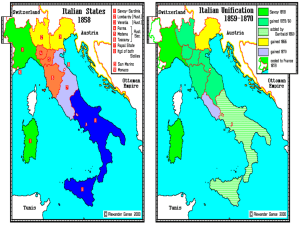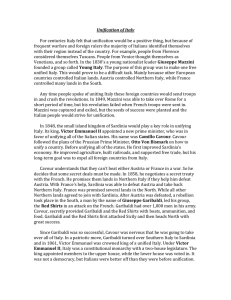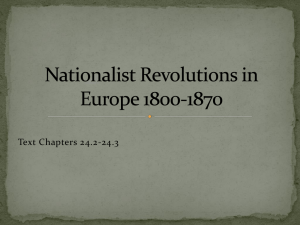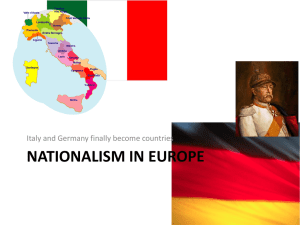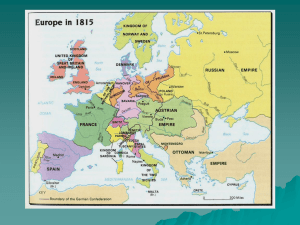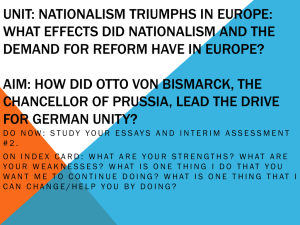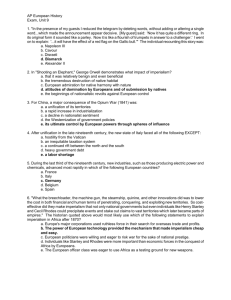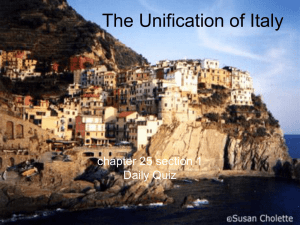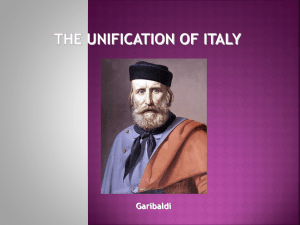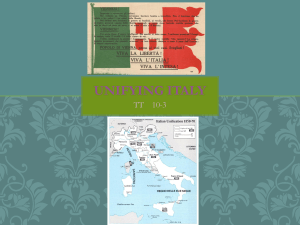The Age of Nation States
advertisement
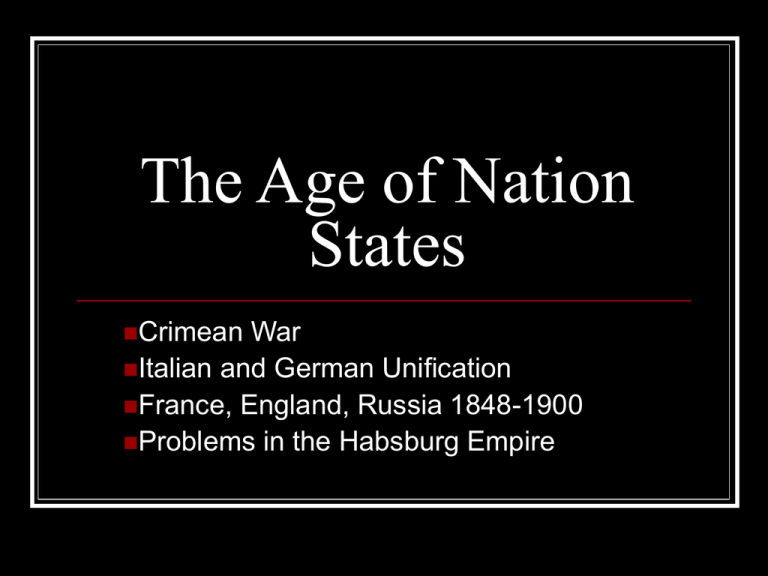
The Age of Nation States Crimean War Italian and German Unification France, England, Russia 1848-1900 Problems in the Habsburg Empire Crimean War Began as a dispute between Russia and France as to who should protect holy sites in the Ottoman Empire Britain and France worried that Russia would become too powerful in the Ottoman region— 1853 they declare war on Russia 1st war to be covered by correspondents Florence Nightingale changed nursing War ended in 1885—Peace of Paris Results: --Turkey won independence --Black Sea neutral --Russians renounced their rights to holy sites within the Ottoman Empire --Russia’s reputation damaged, lagged behind the rest of Europe in many ways --England emerges as the strongest European power --undid what the Congress of Vienna tried to accomplish in the Concert of Europe Obstacles to Italian Unification Northern Italy is prosperous, Southern Italy is largely agricultural, poor Pope’s influence and control of papal states Foreign countries ruled over parts of Italy Unification of Italy 1848—liberals failed to unify Italy Before liberation, Italy was divided into Piedmont-Sardinia, Lombardy-Venetia, the Papal States, and the Kingdom of Naples Giuseppe Mazzini– tried to unify Italy in 1848, was a member of the “springtime of the peoples”, hated absolutism and aristocracy, believed unification had to be through the people, not through only one kingdom, formed a secret society, “Young Italy” to mobilize the masses King Victor Emmanuel II, King of Sardinia appoints Camillo Cavour as Prime Minister in 1854. Camillo Cavour Impressed w/England and France’s prosperity and attributed it to aristocratic liberalism Boosted economy by lowering tariffs, building RRs, strengthening army Applied civil codes to the clergy, lowered their income, taxed church property Wanted Italy unified under Piedmont—Sardinia Believed use of force was necessary—get rid of Austria Got Napoleon III to help Sardinia in the case of a war with Austria (Napoleon offered because Sardinia helped France out in the Crimean War and Sardinia promised them some land in return for help) War with Austria Marriage arranged between Napoleon III’s cousin and Victor Emmanuel’s daughter—he will rule the Papal States 1859—Austria invades Sardinia, bringing the French into the war Due to Sardinia’s military successes and fear for the Pope’s life, France got nervous Without consulting Cavour, Napoleon arranged for an armistice w/ Austria. Cavour and Victor Emmanuel felt betrayed In the armistice, Austria lost Lombardy but kept Venetia in the Treaty of Turin (1860). Sardinia annexed Tuscany, Modena, Parma and Bologna but ceded Savoy and Nice to the French Giuseppe Garibaldi— -- an Italian nationalist and member of Young Italy -- was angered by the armistice because it cut short unification. --organized an army of volunteers, The Red Shirts --went to Sicily and liberated the people there from Francis II (Bourbon Monarch) --then the Red Shirts went to the Peninsula, took Naples. Cavour sent troops to “help” Garibaldi— the combined forces ended papal resistance and kicked out the royal Bourbon family of Naples Final Steps to Unification 1866 Austro-Prussian War, Venetia becomes part of Italy 1870 Franco-Prussian War, French troops leave Rome Early Troubles in Italy Cavour died—bad timing, country needed his administrative abilities Most people remained loyal to local governments, mafias, church 70% population was illiterate in 1871 Pope refused to recognize Italy’s existence Transformismo system—political opponents were “transformed” into supporters through bribery, favors, or given seats in the cabinet—very corrupt. Italia Irredenta German Unification Did not come through liberal means Upper classes were wary of any change that would threaten the status quo Unclear who would dominate—Prussia or Austria? 1850s were repressive—many democrats/nationalists had fled the country (not enough left to work for unification effectively) Prussia Takes the Lead--Why? Territory gained in Rhineland after the Napoleonic Wars Strong economy (Zollverein) Homogeneous population, mostly German speaking and Protestant Hohenzollerns had an effective bureaucracy and a supportive noble class (junkers) Otto von Bismarck “The Iron Chancellor A junker Germany would be united through “blood and iron” tactics, practiced realpolitik Parliament didn’t give him the $ he wanted, so he raised taxes, enlarged the army and passed his own reforms—no one stopped him War w/Denmark—1864 over Schleswig and Holstein, German victory Austro-Prussian War— --enlists Italy’s help by promising them territories --gets France to agree to stay out of it --defeats the Austrians in 7 weeks --makes the peace agreement lenient to keep Austria out of the next conflick --creates the North German Confederation Franco-Prussian War --war w/France began because of a dispute over a Hohenzollern taking the Spanish throne --after William I tried to settle it peacefully, Bismarck re-wrote a memo, making it look like William had insulted the French (he really wanted war). He released the memo to the public causing Napoleon III to declare war on Prussia --Prussia defeated the French (Battle of Sedan) and took Alsace-Lorraine Ramifications of the New German State Bismarck launched Kulturkampf, an attack on the Catholic Church and Socialists—both backfired as they became more popular—he was fired shortly after New, strong, military state—made Europe nervous, changed the balance of power Created a bitter enemy—Francy Rising economic success of the new Germany created competition w/England, leading to the scramble for colonies England, France and Russia 1848-1900 England --Crystal Palace built, symbolizing the potential of industrialization --William Gladstone, prime minister, tries to expand the vote, Disraeli (his successor) does --rise of 2 party system, decline in the power of the monarchy France --Napoleon III led France to economic prosperity and made some liberal reforms but he got them into the Franco-Prussian War, was captured and exiled --Third Republic, challenged by the Paris Commune (20,000 killed) which lasted 2 months --Third Republic stabilized until the Dreyfus Affair which split France down the middle and made the conservatives seem very antisemitic. Emile Zola wrote a letter accusing the govt of lying—he was sent to prison Russia --1861 Alexander II frees the serfs --created zemstvos (local govts) --Alexander III made great strides in industrializing Russia, constructing RRs and factories
